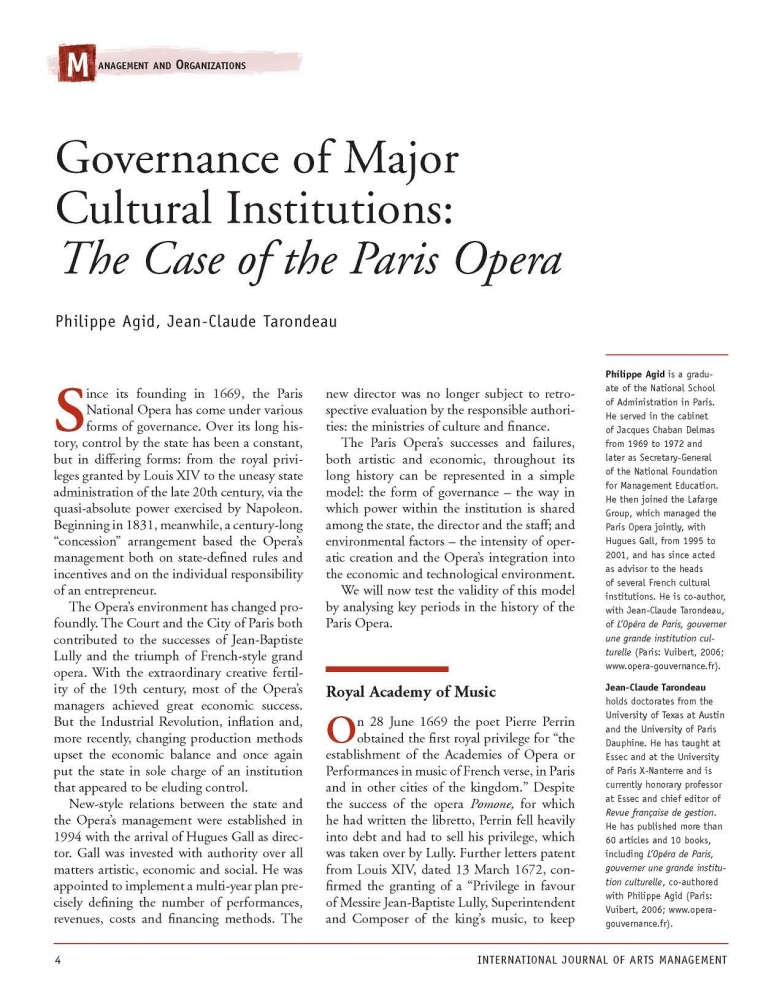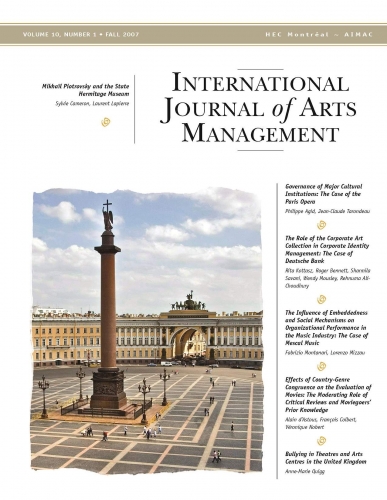Governance of Major Cultural Institutions: The Case of the Paris Opera
Produit: Article
21,00 $ CA
Philippe Agid, Jean-Claude Tarondeau
Philippe Agid is a graduate of the National School of Administration in Paris. He served in the cabinet of Jacques Chaban Delmas from 1969 to 1972 and later as secretary-general of the National Foundation for Management Education. He then joined the Lafarge Group, which managed the Paris Opera jointly, with Hugues Gall, from 1995 to 2001, and has since acted as advisor to the heads of several French cultural institutions. He is co-author, with Jean-Claude Tarondeau, of L’Opéra de Paris, gouverner une grande institution culturelle (Paris: Vuibert, 2006; www.opera-gouvernance.fr).
Jean-Claude Tarondeau holds doctorates from the University of Texas at Austin and the University of Paris Dauphine. He has taught at Essec and at the University of Paris X-nanterre and is currently honorary professor at Essec and Chief Editor of Revue française de gestion. He has published more than 60 articles and 10 books, including L’Opéra de Paris, gouverner une grande institution culturelle, co-authored with Philippe Agid (Paris: Vuibert, 2006; www.operagouvernance.fr).
ABSTRACT
This article results from a longitudinal study of the Paris Opera from its creation in 1669 up to the present time. The Opera’s successes and failures, both artistic and economic, throughout its long history can be represented in a simple model linking the institution’s autonomy with respect to the state and it artistic and economic performance. The authors trace the form of governance at the opera – the way in which power is shared by the institution and the state and by the director and his staff – as well as environmental factors: the intensity of operatic creation and the Opera’s integration into its economic and technological environment.
KEYWORDS
Cultural institution, governance, autonomy, artistic performance, economic performance, Paris Opera
RÉSUMÉ
Cet article est issu d’une recherche longitudinale sur l’Opéra de Paris depuis sa création par Louis XIV en 1669 jusqu’à nos jours. Pendant cette longue histoire, un modèle simple qui lie le degré d’autonomie de l’institution vis-à-vis des tutelles publiques et le niveau des performances semble rendre compte des succès ou des échecs, artistiques et économiques, que connaît l’opéra de Paris. le mode de gouvernance, c’est-à-dire la manière dont le pouvoir est partagé au sein de l’institution entre l’État, le directeur et le personnel fournit une partie de l’explication. Celle-ci doit être complétée par des facteurs d’environnement : l’intensité de la création d’œuvres lyriques et les conditions d’insertion de l’Opéra dans l’environnement économique et technologique.
MOTS CLÉS
Institution culturelle, gouvernance, autonomie, performance artistique, performance économique, L’Opéra national de Paris
RESUMEN
Este artículo es el fruto de una investigación longitudinal sobre la Ópera de París, desde su creación por Luís XIV en 1669 hasta hoy. Durante su larga historia, los éxitos o fracasos, artísticos y económicos, de la Ópera de París parecen poder explicarse mediante un modelo sencillo que vincula el grado de autonomía de la institución respecto a las tutelas públicas y el nivel de las presentaciones artísticas. La gobernancia, es decir la manera cómo, en el seno de la institución, se reparte el poder entre el Estado, el director y el personal, proporciona parte de la explicación. La completan factores del entorno mismo: la intensidad de la creación de obras líricas y las condiciones de la inserción de la Ópera en el ámbito económico y tecnológico.
PALABRAS CLAVE
Institución cultural, gobernancia, autonomía, representación artística, rendimiento económico, Ópera Nacional de París

